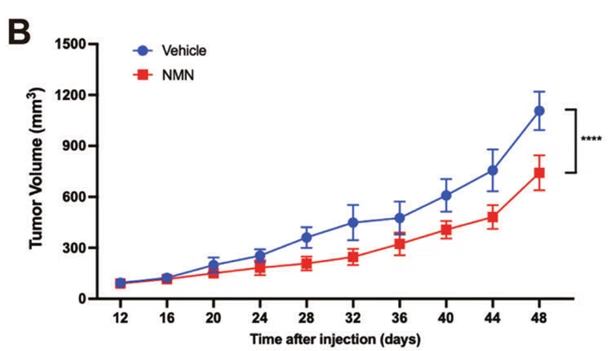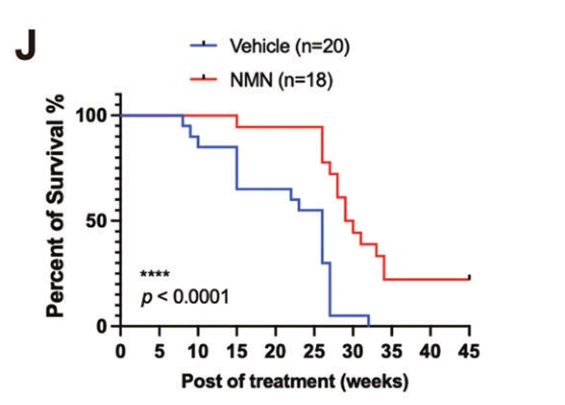
Mar 03, 2023 / Author: China Glutathione suppliers & NMN manufacturers
In 2020, there will be 2.26 million new cases of female breast cancer worldwide, replacing lung cancer as the world's largest cancer. Breast cancer can be divided into various types according to the difference of estrogen receptor (ER), progesterone receptor (PR) and human epidermal growth factor 2 (HER2). Different types of breast cancer require different treatment methods. For example, ER-positive breast cancer can often be effective with endocrine therapy.
Among all types of breast cancer, triple-negative breast cancer (TNBC), which is negative for ER, PR, and HER2, is the most difficult to treat, accounting for about 15% of breast cancer cases. Since ER, PR, HER2 receptors are all negative and lack of vulnerability, common treatments don't work, and chemotherapy is one of the few options.
Compared with other types of breast cancer, TNBC tumors are more likely to metastasize, prone to early recurrence, and have a shorter overall survival. Therefore, new therapeutic methods are urgently needed to treat TNBC.
Previous studies have found that NAD+ metabolism is associated with cancer, mainly playing a key role in tumorigenesis and tumor metastasis. In addition, NAD+ is also a substrate for sirtuins and PARPs, which exert oncogenic or tumor suppressor activity depending on the cellular and tissue environment.
In order to understand the role of NAD+ metabolism in TNBC, the team of Professor Luo Yongzhang from Tsinghua University conducted research, and the results were published in the top journal "oncogene". They found that NMN can inhibit the growth and metastasis of TNBC tumors in mice, significantly improve the survival of mice after cancer, and may be a potential treatment for breast cancer.

1. NMN slows the growth and spread of breast cancer and prolongs survival
The researchers first injected HCC1937 cancer cells into the inguinal mammary fat pad of NCG mice to induce triple-negative breast cancer (TNBC).
Then the mice were injected with 500mg/kg of NMN every day. After 48 days, the tumor volume of the mice in the NMN group was 10% smaller than that in the control group. In addition, H&E staining also showed that the area of lung metastasis in the NMN group was smaller. This indicated that NMN significantly inhibited the growth and metastasis of TNBC tumors.

Figure 3: Volume of tumors in NMN and control mice
The researchers also tested the lifespan of the mice, and the results showed that the average lifespan of the mice in the NMN group was prolonged by 15%, indicating that NMN can increase the survival of mice after the onset of TNBC by inhibiting the proliferation of cancer cells.

Figure 4: Survival rate of mice in NMN group and control group
2. NMN activates SIRT1 and inhibits cancer cell metastasis
As a precursor of NAD+, NMN can significantly increase NAD+ levels and activate the longevity protein SIRT1, which is responsible for repairing DNA and eliminating reactive oxygen species (ROS) in cells. Therefore, the research team speculates that the anti-breast cancer benefits of NMN stem from the activation of SIRT1.
After testing, the level of SIRT1 in TNBC tumors was lower than that in normal human breast epithelial cells, further supporting the researchers' speculation. In order to thoroughly confirm, the researchers knocked out SIRT1-related genes and found that NMN could not inhibit the metastasis and growth of TNBC without this protein, which indicated that NMN indeed inhibited cancer metastasis by activating SIRT1.
The researchers further explored the mechanism of SIRT1's tumor suppression and found that it was related to SIRT1 reducing the phosphorylation and acetylation of p66Shc.
3. Summary
This study found that NMN can inhibit the growth and metastasis of triple-negative breast cancer and prolong the survival of cancer patients by activating SIRT1. Interestingly, addition of NMN had no effect on the proliferation of HCC1937 cancer cells in in vitro studies. The researchers believe that NMN may also increase the anti-cancer response of immune cells, thereby inhibiting tumor growth.
Previous studies have found that the use of lower doses (250mg/kg/day) of NMN has no effect on tumors, which means that the anticancer effect of NMN is dose-related,It is important to note that the above studies are only for breast cancer, and it can only be said that high-dose NMN has the potential to inhibit TNBC. As for whether NMN is anti-cancer or tumor suppressor, there is still debate. As mentioned at the beginning, it is different in different cells and tissues.
Supplier Introduction: China glutathione supplier and NMN manufacturer GSHworld, the company mainly develops biotechnology and industrialization. As a global pioneer in enzymatic catalytic ATP regeneration technology, our company advocates green production and is committed to providing customers with better and more environmentally friendly products and services. Glutathione Manufacturer,NMN Factory,Citicoline Sodium supplier,China NMN manufacturers
PREVIOUS:The beauty history of L-Glutathione Reduced
NEXT:Effects Of Long - Term Supplementation Of NMN On Heart Function in Old Mice And Its Mechanism.
+86-755-23577295
+86 18718790084
Room 832, Building 12, Shenzhen Bay Science and Technology Ecological Park, Yuehai Street, Nanshan District, Shenzhen China